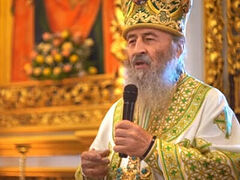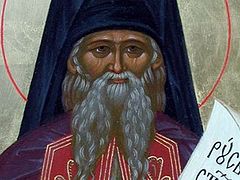 Nikita Pustosvyat. Arguments about the Faith. 1880–1881. Fragment. Artist: Vasily Perov.
Nikita Pustosvyat. Arguments about the Faith. 1880–1881. Fragment. Artist: Vasily Perov.
Recently the Ekaterinburg priest, Schema-Igumen Sergiy (Romanov) was defrocked by the resolution of the Diocesan Court. Sadly, it was the predictable outcome of a lengthy and destructive process that holy fathers call “prelest” (spiritual delusion.—Trans.).
While many Orthodox people decry the rebellious and provocative actions of the disgraced schema-igumen, they still believe that the issues he raised were relevant and important.
One can’t help but think that Satan himself incites quick-tempered and radically inclined people to rise up and rebel against injustices, some of which are quite real, so that the movement against such injustices is discredited as “obscurantism”. All you need to do is form a group of “zealots” guided by a “real” priest, give them the “icons” of Ivan the Terrible and “elder” Gregory Rusputin, throw in a few banners with cruces gammatae (swastikas), and any good cause will be discredited and bound to fail.
Should we openly and squarely discuss some urgent and complicated problems, such as Church life and the relationship between Church and State? This is not a trifling matter as these problems are facing every Christian, or any concerned and reasonable individual for that matter.
Some think that we must not upset people by discussing “awkward and difficult” issues, because there is too much negativity in life as it is. Let us talk about the positive, they say, and life will gradually become better on its own. In reality, the need to talk about “the positive” doesn’t replace the need to ponder and solve the current problems. When ignored, these problems do not disappear; instead they accumulate and eventually burst out, accompanied by scandals and clamor. Sometimes they even threaten to destroy the whole system from within.
Now, another question arises. Does having an uncompromising position and fighting for justice always mean upholding the truth?
Browsing the Internet, I came across an article written by a man claiming to be a priest and a follower of the so-called Catacomb Church. This man lambasted St. Luke (Voyno-Yasenetsky), accusing him of servility and betrayal of the ideals of Orthodoxy to appease the authorities. Among other things, this man quoted from St. Luke’s articles published in The Journal of the Moscow Patriarchate over the years. Indeed, these quotes contain quite a few statements demonstrating the saint’s loyalty to the Soviet regime. But can this be labeled as betrayal?
St. Luke, just like Patriarch Sergiy (Stragorodsky) and later Patriarch Alexiy (Simansky) lived in times when due to certain circumstances the atheist authorities were making clear, albeit small, steps toward the Church and, naturally, the Church was expected to reciprocate. Was this against the teachings of the Church? Not at all. These compromises (which were social rather than dogmatic) allowed the maintenance of church life and made the lives of millions of believers in Russia easier. It is from this standpoint that we must consider these examples of oikonomia (lenience).
In contrast, there were uncompromising and steadfast “fighters for the truth”, such as “dissident” priests Nikolai Eshliman and Gleb Yakunin. These priests lived in times when the Church was persecuted and they seemed to be speaking the definitive truth, upholding the “sacred” freedom of religion. But ultimately their fight for justice was fallacious and they came to a sad end. God will be their judge, of course, but the results of their actions and many notorious facts allow us to form a general opinion about their activities.
Clearly, it was God’s will that the Russian Church would go through a period of persecutions in the twentieth century. Millions of believers went through their trials by fire and many gave their lives for their faith. Was this fair? Obviously, not, but it was God’s will for the Church to suffer through this period. And those who did not agree with the lies but bowed their heads and meekly and humbly endured the trials to the end were rewarded with sainthood. In contrast, those who fought against the lies yet were consumed by anger and rebellion abandoned the Church and met their sad end.
There is an obvious dilemma that we must always keep in mind. In one way or another, the State is always attempting to influence the Church for its own benefit. In fairness, we must also mention the Church’s influence on the State. Truly religious influence, that is, spiritual rather than administrative in nature, is doubtlessly positive and beneficial for the State, while the State’s influence on the Church often pursues purely pragmatic and secular purposes in the interests of “men of the flesh” and as such cannot be unconditionally accepted. It seems natural and normal to constantly define and discuss those “red lines” that the State should not cross, just as the State is probably entitled to define such boundaries for the Church. This seems to be an appropriate and useful practice for mapping out the life of the nation characterized by both integrity and diversity of spiritual and moral beliefs.
Metropolitan Anthony of Sourozh offered a wonderful insight into the reality of church life and our actions:
“We believe in one Church but create and live in another Church. The empirical Church, the Church where we actually live and function, is very different from the Church we believe in... I know that the majority of the clergy never criticize or question anything Church-related. But I think that if we do not question the things that must be corrected, we will be unworthy of the Church we believe in.”
We love our Church and our country with that passionate love that urges us to expose all the injustices and iniquities in the earthly arrangement of the Church and the State as well as in the relations between people. “What can you change?” they ask us. We can answer with confidence that we can achieve a lot with God’s help! We can and must change ourselves and we can help people change their attitude toward many important issues. We must do this in Christ and with Christ for the glory of God. This is in no way contradictory to God’s commandment about meekness and humbleness. When it was necessary, Our Lord preached, criticized and even spoke out in anger, but He did all of that with love, giving His life for His sheep.
When we complain about the horrendous and meaningless bureaucracy, for example, we don’t mean the State in general, because we understand that the State is the “foundation” of our country and we are sincerely grateful to it for many things. Still, we castigate the inhumanity and indifference of the officials working in “the system”. We criticize this inhumane “system” that is trampling on the lives of people and claiming that it is all “in accordance with the law”. We will keep on saying that there should not be a “system” like that in our country, and if such system exists, we must do our best to change it, so that the relations between people in our country, irrespective of social, psychological or financial differences, would be built upon the principles of compassion, Christian love and mercy. Laws must facilitate development of such relations, rather than break them and crush the lives of people. We believe that with God’s help our joint efforts can change the life in our country for the better. We will speak about it and do everything possible to make sure that people are guided by mercifulness, love and compassion, rather than by an “inhumane system” (even if it is a so-called “system of law”). If necessary, these virtues can even be prescribed by law.
We shouldn’t be afraid to distance ourselves from other nations spiritually, morally and culturally, as we clearly recognize our calling and our destiny. This is in line with the words of St. Paul who said,
This I say therefore, and testify in the Lord, that ye henceforth walk not as other Gentiles walk, in the vanity of their mind, Having the understanding darkened, being alienated from the life of God through the ignorance that is in them, because of the blindness of their heart: Who being past feeling have given themselves over unto lasciviousness, to work all uncleanness with greediness (Eph. 4:17-19).
Coming back to the life of St. Luke, the Archbishop of Crimea, it should be noted that despite his prudent loyalty toward the Soviet authorities, he frequently was strict and uncompromising in certain issues that were crucial for the Church. Without making himself out to be a “fighter against the regime”, this saint, just like many other saints of the twentieth century, could make concessions in some general issues, while being firm and consistent in upholding the truly important principles. This was what allowed the Church to maintain its identity as the formative “backbone” of society even during times when the atheistic ideology of the State was dominant.
We can and must talk about the synergy between the State and the Church, considering that a higher quality of life doesn’t contradict the Church’s teachings, and that people’s spiritual and moral self-actualization is becoming an increasingly obvious priority in the government’s domestic policy. In other words, in our times and in our country, we all have a unique and amazing opportunity to build a life of kindness, grace and redemption.





